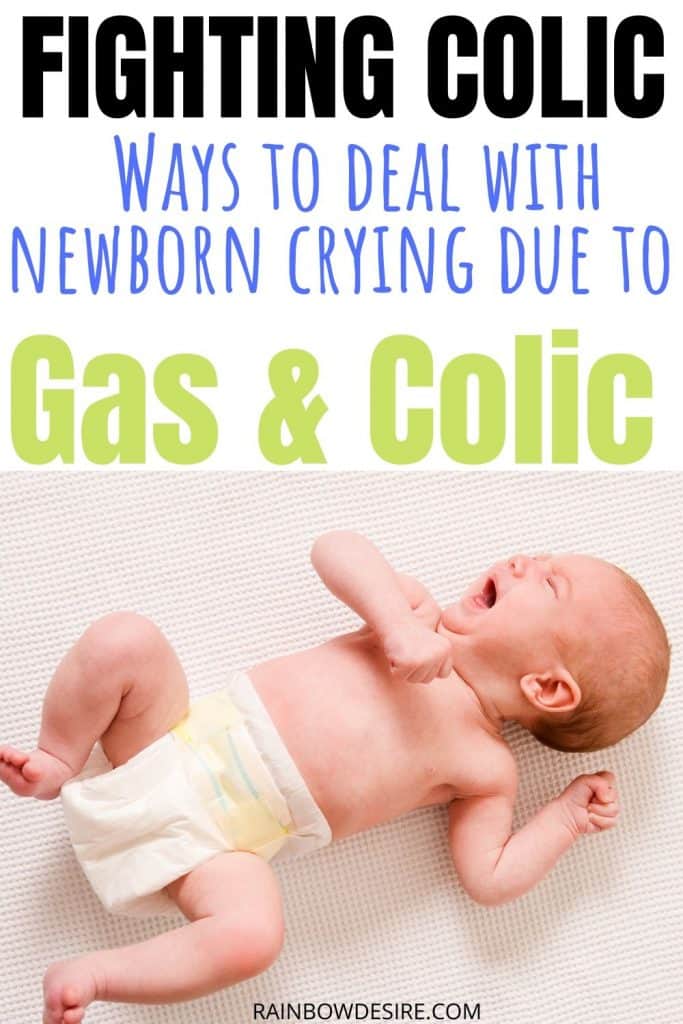Newborns’ first cries have a significant purpose. Crying allows newborns to make a momentous shift from being dependent on the oxygen carried to her in her mother’s blood before birth to breathing it in on her own as she enters the outside world.
Newborn babies’ cries are loud and tearless for the first several months. For new parents settling with a crying baby is a huge adjustment, whether your baby is a colic baby or just fussy over something that is bothering her.
While you are adjusting to this whole new crying thing, remember, babies, know no other way of communication.
As a first-time parent, the biggest struggle is when you have to figure out WHY IS YOUR BABY CRYING.
Newborn cries on average for 2 hours at 2 weeks of age to a peak of 3 hours by 6 weeks of age. Eventually crying decreases as the baby grows. Whereas, colic babies cry repeatedly with regular crying spells at one particular time of the day, for no apparent reason, at least 3 days a week, and for more than 3 hours at a time.
When you are trying to figure out the reasons why your baby crying, you need to ask a few questions to yourself.
This post may contain affiliate links. Please read our disclaimer for more information.
What is Colic baby?
Well experts say that baby is colic if she is crying for more than 3 hours regularly for a prolonged period of time. Colic can start in the first few weeks after birth. Babies grow out of colic and excessive crying within 3 to 4 months after birth or earlier.
What are the Symptoms of a colic baby
- If a baby cries for at least 3 hours a day for at least 3 days a week and for more than 3 weeks, then you can say the baby has colic.
- Baby is crying for no specific reason, she is not hungry or does not need a diaper change.
- Turing bright red or purple
- Clenching their fists and curling up legs
- Crying like they are in pain

What are the Reasons for Colic
Well, the reasons for colic may vary from baby to baby. However, some of the main reasons are;
- Indigestion or gas may cause colic.
- Overfeeding or underfeeding your baby.
- Sensitive digestion to formula or breastmilk.
- A lot of air going in while feeding.
- Baby digestion system has not fully developed
How to control colic
Colicky babies take their time to get out excessive drying although it may get stressful for parents at times. There are ways by which you can control colic in your baby.
Practicing 5 Ss for Colic Babies.
1. Swaddling
Using a good swaddle blanket for swaddling your baby may help you deal with colic. Babies feel a lot more snug and secure when they are swaddled. Make sure you have babies’ legs in a frog-like position as in the womb.
Love to Dream swaddle up is parents’ number one choice.
Wearable blanket and a swaddle in which babies are free to move their legs work just fine. When you buy a swaddle make sure the baby’s legs are free to get in a frog-like position, and it is not tight on the hip area.

2. Side stomach positioning while awake
Lay your colic baby on the side while she is awake. This can help her gas move out more easily.
3. Shushing
This is another “S” you can try to soothe your baby. Using a rocking chair for yourself could make a phenomenal difference.
You need a rocking chair with an ottoman so you do not feel more tired (when you already are) and snooze for a little bit while shushing your baby.
4. Swaying
Hold your baby and secure them in your arms and try swaying her. This can significantly help to soothe a crying colicky baby.

5. Sucking
Offer a pacifier or feed more frequently. As a new mom, you must know it is not a good idea to offer a pacifier right away while you are struggling with milk supply. However, you can resume pacifier for your baby in about 4 to 6 weeks after birth.
What parents need to do when dealing with colic
1. Feed more frequently and on-demand
Cluster feeding can help colic babies as when they are on empty stomach it is going to make them a lot more gassy and fussy.
2. Change Formula
If your baby is formula-fed, you may want to change the formula as this may be one of the reasons your baby has an intolerance to one of the ingredients used in the formula

3. Care while Preparing a milk bottle
When you make a baby’s feeding bottle, wait for a few minutes to let all those bubbles settled down first. These bubbles can significantly worsen gas or colic issues.
These could be very effective in calming colicky babies during the first few months of life.
Use anti-colic baby bottles and see what works for your baby. You have to make sure anti-colic bottles have many accessories that need deep cleaning with each use.
4. Use Gas drops
These gas drops have been a lifesaver. Works great for babies.
However, this gripe water by mommy bliss is phenomenal. Not only it helps relieve the gas also, but it also helps babies sleep exceptionally better.
5. Using Probiotics drops
Probiotic drops help with indigestion. Using probiotics for colic babies may significantly reduce crying.
6. Wearing baby
For newborns using a baby sling wrap can help soothe a crying baby. Staying close to Mama is a perfect treat for babies.
7. Invest in a good bouncer
You need a bouncer or a rocker for the baby to soothe her while crying. This 2-in-1 bouncer and bassinet is an exceptional product for babies. It will help babies to go to sleep and also you can lay them on their back without moving or taking them out of the bouncer. Incredible!
This BabybJorn bouncer is adjustable to the baby’s different stages. For colic babies, this has been sworn by many moms. It is definitely a must-have baby gear.
8. Be more responsive to baby’s needs
For the first several months of the baby’s life, you should omit the possibility of spoiling. Newborns cry as that’s the only way they know how to communicate and once you hear your baby crying, it is highly advisable to promptly respond to their needs so that would send her a message that you are there to tend to her needs.
No matter how hard this may get for parents, you need to keep these things in mind when you have a crying baby at hand.
Soothing doesn’t mean you are spoiling your newborn.
9. Identify baby cries
When your baby cries, try to read the cues why is your baby crying. You as a parent have to figure it out.
Important questions to ask about possible reasons for crying
- When was the last time the baby has eaten?
- Needs a diaper change?
- May be sleepy
- Probably over-tired
- Chances are you are missing a part of her routine that is making her uncomfortable.
Newborns cry are tearless and due to these reasons as they do not have any other way of communication. The main reasons for a baby crying other than colic are:
- Hungry
- Startled
- Cold or hot
- Wet or dirty
- Bored or annoyed
- Tired
- Have gas
- Acid reflux
- Might be too overstimulated
- Change of environment
- Wants to be cuddled up
- Uncomfortable in stomach
- Need to burp

Learn more
Effective ways of How to relieve gas issues in babies.
Or some more serious reasons you may figure out
- Fever
- Illness
- Poking pins
- Eyelash or scratch in the eye.
- Wayward hairs or strings wrapped around finger or toes.
- A rash
Sometimes after serving all those possible reasons, babies still end up crying and that’s what they probably want to do.
Get professional help if your baby is crying inconsolably. There might be something your baby needs help with.
Soothe yourself: this is very important, as for parents hearing a crying baby for a prolonged period of time may get nerve-wracking. Take your time and soothe yourself.
10. Stay composed
Moms get stressed out when babies are crying. You have to keep calm, take a deep breath and if needed take a break. If you are not ready mentally, emotionally, or physically, take help from anyone available during that time, husband, or friend
Put baby down for a little while safe and secured and compose yourself, as long as you are around, it doesn’t hurt the baby to cry for some time.
Babies may pick up stress around them and start crying on negative vibes around them.

11. Snug, rock and secure
Snugging can be helpful in some cases as they have been living all snug and cozy in the womb for 9 months. Either snug her in a swaddle or put her in a rocker or bouncer. The vibrating sounds may help to calm a crying baby.
Take her on a drive, rock her in a bouncer.
Wear her move around snug and secure
Hold her and move around, shush and sway.
Just make sure you have all safety features on, the baby is buckled up and secured.
12. Sound Effects
A familiar sound of music, vacuum, machine, song, heartbeat sound, works every time in calming a crying baby. Hold your baby close to your heart and let her listen to your heart beating. This sound she has heard for a good 9 months.
Use a baby soother that would be an awesome help in baby sleep and shush.
13. Giving Baby a Massage
Giving a baby a soothing body massage may help. Bathing is also helpful in calming baby, depending on how much babies enjoys being in the water.
Baby oil for massage is essential for relaxing babies’ tummies and helps relieves gas.

14. Clothing concerns
If your baby is cold, put on another layer of clothing. And if she is hot, remove one layer. Babies tend to get super warm when they are sitting in the car seat for a long time as it has no ventilation from the back.
15. More tips to soothe a crying baby
- If it is too loud, turn the volume down. If it is too dark, making it brighter may help.
- Although there is no rocket science, you just have to figure out by trying different ways for soothing baby.
- Chances are after trying all these possible solutions babies may settle down after a while if you give them some time. However, if you are concerned and uncomfortable with so much inconsolable crying, seek your pediatrician help.
- Keep things moving as babies are receptive to the noise around.
- Opposites attract: If mama is emotionally or mentally exhausted, hand in baby to the dad if he is around.
- Handoff: if you need a break, just put the baby down securely in a crib or a bouncer, buckled up and take a break for a little while.
- Give it time: letting your baby cry doesn’t harm as long as baby is safe and you are responding to her needs. Giving it time to cry it out may help.
- Never shake a crying baby no matter how frustrated you are. Safely lay a baby in her crib and walk out of the room for a while to have your stamina together.
Read more
Fun and play activities for babies 0 to 6 months old
Easy play ideas to entertain babies at home
Play activities for babies 6 to 9 months old.
13 Reasons why do babies cry and how you can soothe.
Seek professional help
If your baby is crying uncontrollably and not settling making you uncomfortable, call your pediatrician without any delay and seek professional help.











